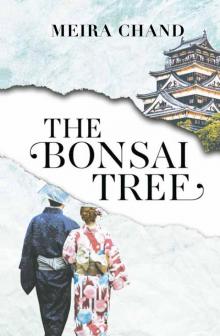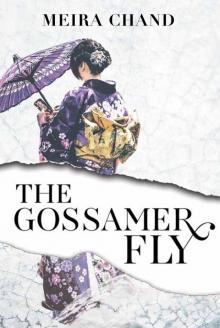- Home
- Meira Chand
Last Quadrant
Last Quadrant Read online
© Meira Chand 1981
First published in 1981 by John Murray (Publishers) Ltd
This new edition published by Marshall Cavendish Editions in 2018
An imprint of Marshall Cavendish International
All rights reserved
No part of this publication may be reproduced, stored in a retrieval system or transmitted, in any form or by any means, electronic, mechanical, photocopying, recording or otherwise, without the prior permission of the copyright owner. Requests for permission should be addressed to the Publisher, Marshall Cavendish International (Asia) Private Limited, 1 New Industrial Road, Singapore 536196.
Tel: (65) 6213 9300. E-mail: [email protected]
Website: www.marshallcavendish.com/genref
The publisher makes no representation or warranties with respect to the contents of this book, and specifically disclaims any implied warranties or merchantability or fitness for any particular purpose, and shall in no event be liable for any loss of profit or any other commercial damage, including but not limited to special, incidental, consequential, or other damages.
Other Marshall Cavendish Offices:
Marshall Cavendish Corporation. 99 White Plains Road, Tarrytown NY 10591-9001, USA • Marshall Cavendish International (Thailand) Co Ltd. 253 Asoke, 12th Flr, Sukhumvit 21 Road, Klongtoey Nua, Wattana, Bangkok 10110, Thailand • Marshall Cavendish (Malaysia) Sdn Bhd, Times Subang, Lot 46, Subang Hi-Tech Industrial Park, Batu Tiga, 40000 Shah Alam, Selangor Darul Ehsan, Malaysia
Marshall Cavendish is a registered trademark of Times Publishing Limited
National Library Board, Singapore Cataloguing-in-Publication Data
Name(s): Chand, Meira.
Title: Last quadrant / Meira Chand.
Description: Singapore : Marshall Cavendish Editions, 2018. | First published:
John Murray (Publishers) Ltd, 1981.
Identifier(s): OCN 1037826463 | eISBN: 978 981 4828 63 5
Subject(s): LCSH: Orphanages--Japan--Fiction. | Typhoons--Fiction. | Japan--Fiction.
Classification: DDC 823.914--dc23
Printed in Singapore
Cover design by Lorraine Aw
For
Kumar
1. Thursday
‘May I come in then?’ Kyo asked. She had not waited at the outer gate, but let herself in and approached the front steps, as if such familiarity was in order. It was twenty years since Eva last saw her.
In the fierce light of the doorstep Kyo’s small figure was bright and hard as a chip of stone. Eva blocked the passage with an arm before the open door. From behind came the odour of stewing bones from the soup she was preparing, a bald and fetid smell. Escaping the kitchen it seeped out about her into the sun of the garden and borders of marigolds. Their colours were deep and velvet against the parched dry beds of soil. Eva stared over the half moons of her glasses, and shock flushed in a cold dry burn.
Dropping her arm from the doorway, Eva moved a few inches back. Kyo’s cheap perfume sharpened her nostrils, before the cooking bones engulfed it. The cloying film of make-up was thicker than before, the lips pulped and soft from that secret life Eva knew little of. But suddenly she remembered the fine texture of Kyo’s skin, stretched over the wide flat planes of her face, scrubbed and shiny, free of make-up, on that first day Eva brought her to the orphanage, more than twenty-five years before. Now she thought, how changed she is, how old she has become; she must be forty-five.
Kyo followed Eva into the room but stopped at its carpeted threshold. ‘Not a thing has changed.’ She looked round in a deprecating way, and then stepped boldly forward.
Eva stood silently, one thought above all filling her head. Why has she come after all these years, when I thought of her as dead? Before her Kyo walked about, touching, appraising the small cramped room. Its frail oriental scale was unsuited to the Western adaption of carpets, chairs and tables. The reflective glass doors of the china cabinet mirrored Kyo’s presence to her. Yes, Eva thought, the room was the same as when Kyo last saw it, except for the twenty years it contained.
Through those years Eva had continued to live on the hill, in charge of St Christopher’s orphanage, and surrounded by the same neighbours. Some way further up the road resided the Englishman, Arthur John Wilcox. Far below, the fortress of the Coopers’ house possessed the narrow sea road along the beach at Suma. From these predestined points upon the hill they consumed a com-mon view, of the Inland Sea of Japan and the town of Kobe on Osaka bay. They dissolved within the same sunset and watched the same unfolding day brim upon the sea. In a small house beside the orphanage Eva Kraig had lived all this time with her daughter, Akiko, adopted from the woman, Kyo Matsumoto. The years had passed between them smooth as glass, until this moment of Kyo’s return.
And the thought of Akiko pressed dark and thick then in Eva’s head. For she feared she knew why Kyo had come, all that she would say. She was thankful Akiko had gone that morning, earlier than usual, across to the orphanage. Whatever the reason Kyo had come, Eva wished to absorb it alone.
‘Sit down,’ she suggested.
Kyo sat with one leg crossing the other. A backless shoe gaped from her foot, a blue vein traced her heel. Beneath the make-up her flesh had the bloodlessness of plants shut away from sun. For she spent her life within a nocturnal warren of bars. Eva knew. She slept through the day, a drained whisky glass beside a stale bed. That was the life she had chosen, of the bars and a night-time world.
Head on one side Kyo lit a cigarette, inhaling with narrowed eyes. She looked deeply at Eva a moment, as if choosing an instant to strike. And Eva waited, cold and fixed, stiff with the twenty years behind that held at their core fear of this moment she knew was about to come. Sometimes she had dreamed of it, and woken. But the child was always there beside her, sleeping, peaceful, safe. Kyo exhaled smoke in a soft whistled breath. It meandered up in gossamer strands through a ray of light. Heat overwhelmed the room already warmed by the bald odour of the cooking soup bones. Eva wished for strength to open the window. But she sat, apprehensive and tense on a high-backed chair, her eyes on the golden sphere of carpet that ended the ray of light. Within it a threadbare warp pushed through a flowered border. Eva kept her eyes there and did not look up. She waited for the words.
‘I want Akiko back.’
It was easier once she had heard them. She raised her head calmly, everything in her stilled. ‘She’s not yours to have back. You relinquished that claim. Easily, gratefully. Have you forgotten? Is it convenient again to become her mother? You know I adopted her legally.’
She knew then that the words had been buried within her through all the years behind, waiting, guarding against this moment. She held her breath and the words reverberated on, filling the room and her head. From the window the shaft of light, like a pale laser beam, divided the space between them. Behind the dusty shifting ray Kyo appeared untouchable.
Eva stood up. She pulled wide the curtains in a rush and clatter of hooks and threw up the window. At once the sinister beam dissolved in sun and the dry smell of hot soil rose from the garden. Beyond the window Eva glimpsed the glassy surface of the sea and the dark shape of Awaji island. That morning the heat was still and oppressive, as if the sky pressed it flat upon the earth. Summer still spread a net over Autumn, refusing to relinquish it.
Eva turned to face Kyo, her back to the window, and saw the woman defenceless. Kyo shaded her eyes against the light, hardness peeled from her face like the skin of a grape on the soft naked flesh beneath. And Eva saw again Kyo’s face on a night she remembered so well, smashed and mobile then with terror. On the night Eva found her, battered, abandoned, flung into a dirty frozen gutter. Then she had taken the girl in her arms, wiped the bruising and blood. Remembering
, pictures surged up, one after another, tumbling into her mind. She pushed them down, to concentrate on Akiko.
Akiko. Her daughter. She could not think of her as less. She could not think of her as Kyo’s child. Already she was twenty-two, years had melted quickly. Often, since the time the child first came to her, they had walked together on the gritty strip of nearby beach, and Eva had seen their shadows mingled there in wet sand, holding hands. At her side the child’s breath was almost her own, in frail shells they had listened for the sea. And at night the child’s body, limp with sleep, hollowed her out with love. Akiko. Eva stiffened and looked coldly at Kyo’s upturned face. Kyo was like bad flesh you cut away, or the rot of fallen fruit.
‘I was ill ... I am ill ... it’s bad. They told me they can’t say anything. Maybe they’ll cure me. I don’t know. I can’t think any more about it.’ Kyo put a hand to her cheek. Eva saw fear and weariness, she saw the loneliness Kyo would never admit.
‘I haven’t lived in Japan for twenty years. I’ve come back because I’m ill.’ The tone was defiant.
‘Where were you all this time? Where did you work?’ Eva asked defensively; she did not want to hear.
‘Bangkok, Hong Kong, Taiwan. Bars, massage parlours, cabarets. Need you ask? Japanese girls are always in demand. I made good money.’ Kyo shrugged. There were fine lines about the corners of her eyes.
‘And you never came back to Japan?’ Eva questioned, feeling suddenly tired, suddenly old. There was a weight behind her lids.
‘Sometimes, for visits.’ Kyo shrugged again.
‘But you didn’t think then of Akiko?’ Eva controlled the anger replacing the first harsh shock.
‘She was all right. I knew you would look after her.’ Kyo brazened.
‘What makes the difference now?’ Eva kept her voice low. She remembered how Kyo’s well-being had obsessed her long before, and felt a double anger. What a fool I am, she thought. Why did I let her in? She must not be allowed to destroy us.
‘I’ve told you, I’m ill. I can’t work. I’ve no money. I’m still Akiko’s mother, you can’t change that.’ Kyo uncrossed her legs and sat forward in her chair.
‘There is no one else to help me. I’ve no other relatives left as you well know, no one else I can go to. What is to become of me?’ She puffed hard at the cigarette, the butt now a limp grey worm on her lip. Eva stared at the stagnant smoke above the woman’s head.
‘What happened to all your money?’ Her heart beat in her head, the words sat stale and furred in her mouth. She wondered if the whole charade was not some figment of a nightmare. She blinked and touched the plait of hair about her head, but Kyo was still before her.
‘I spent it. There is nothing left. Somebody has to help me. You were always so kind ... I thought ... I have never forgotten ...’ Eva tried not to hear the desperation.
‘Where else can I turn to but Akiko and you? Akiko is old enough to earn a living. She must help me. There is no one else. No one.’ Kyo lowered her voice suddenly and said the words persuasively, playfully almost, except for their careful rounding. Slyness passed in her face like a shadow, her gaze nakedly prospecting in the dead hot air of the room.
Eva held her eyes and saw in them only darkness and arithmetic. The room became tight about her. The odour of perfume and hot dust thickened. She spoke quickly.
‘I’ll get you some coffee.’ The words sounded light and ridiculous.
2
Her eyes would not adjust to the dim space after the sun-filled room. Eva felt her way blindly along the short passage until her fingers touched the kitchen door. She slid it open and the glass panes shook like teeth in old gums. Inside, she leaned against it, the wooden lattice about the glass pushed into her back. Before her the brown of wood and slopped meals stained the room; it contained this history in a dank ripe smell.
She placed two cups on a flowered lacquer tray. Soon the kettle belched hotly, frosting the window above. In the pan the simmering bones, thick with scum, covered her face with fusty steam. Replacing the lid she picked up the kettle; on the window condensation shrank from the corners of the glass. Behind the mist the ungainly facade of St. Christopher’s orphanage could be seen. Eva had worked with the orphanage for many years. She had come to Japan when her father left England for a posting in Japan, and had finished her education in a mission school in Kobe. When she left, returning to England for medical studies, her parents stayed on in Japan. But soon after she qualified they were killed in a car crash, and she returned to settle their affairs just before the war broke out. Her work with the mission started when she returned to Japan with the Red Cross after the war had ended, during the American occupation. Soon, the orphanage had begun to take shape, a few nuns and herself, working from a derelict barracks with a handful of orphans and destitute women. It all grew from there, and afterwards she took the job the mission offered, happy to stay on. She never married.
Eva sighed, picked up the tray and walked back to the room, calmer. From outside she heard the creak of boards as Kyo moved around. As Eva opened the door, Kyo powdered her nose before the mirror. Sun burnished to a blatant copper her coarse and much-dyed hair that darkened at the roots. Her narrow back reflected all the awareness of a coquette. Eva placed the tray on the edge of the table. Within a cup her own face stared up at her, mirrored in the thin black liquid. She broke it quickly with a stream of milk.
At the beginning she had told the child, Akiko, I do not know. Pushing down the wish to lie, to say, your mother is dead, do not ask of her, it is I who am your mother. She stilled the wish and told the half-truth calmly. I do not know. But the child insisted. Where is she? Who is she? She must be somewhere still? My real mother. Even when she reached an age when she no longer asked, Eva knew she kept that childhood persistence locked in her still. Who is she? Where is she? Akiko would ask herself forever.
‘I cannot persuade the child to accept you, one way or the other. It is for her to decide, not I. But I must tell you, she does not think as you do. She has not been brought up in a Japanese way. And you could not have expected that when you left her with me.’ Stirring her coffee, Eva felt the grit of sugar scrape beneath her spoon.
‘I suppose not.’ Kyo shrugged indifferently. ‘Is she here? Why don’t you call her?’
‘She’s not here now. She’s gone to work.’ Eva spoke slowly. She pictured an innocent Akiko amongst tables of breakfasting orphans.
‘What work?’ Kyo looked up abruptly. ‘Is she earning money already?’ Her eyes took on new interest.
‘She took a course in kindergarten teaching when she left school. It was what she wanted to do. Now she works in the orphanage with me,’ Eva replied.
‘You could call her from there. It’s only across the road.’
‘No.’ For she could face no more that day. The stagnant heat filled the room, and from the garden came the rasping saw of a cricket.
‘No,’ Eva repeated. ‘Perhaps I should prepare her.’ Though how she did not know.
‘I’ll go then.’ Kyo stood up and stubbed out her cigarette in an ashtray. She coughed and the ash blew up in a fragile cloud and settled on a bowl of yellow daisies. She straightened, tiny and bony as a little bird. But her neck was arched, stringy and deliberate and her long thin eyes glittered, dark.
‘There is no need to prepare her. I have written already, several days ago.’ She turned before Eva out of the room. ‘I’ll be in touch now, you’ll be hearing from me.’
Eva returned slowly to the lounge. Kyo. Akiko. She sat down again, and the last hour seemed like a dream. It was already only nine thirty. It was her own fault, she thought bitterly. She had allowed the years to pass in false certainty. The moon left a silver trail across the bay each night, and shone transparent in the morning. She had watched it each day, unfaltering, and saw the future sure and safe. She adopted the child legally, and it seemed as if Kyo was dead. Eva ceased to fear her presence, existing somewhere in the world. The child lived with her, safe and clo
se. In the dark she could reach out and touch her. Nothing else mattered.
Now she remembered again the night she found Kyo, thrown into a Tokyo gutter, after the war. She was only eighteen, gashed and bruised and gaunt on subsistence food. She had broken the organised code of the streets and tried to run away. After the war, her farmer father had sold her into the red-light world, to provide for her brothers who were of use on the land. A heartbreaking but honourable course of action. Destitution was great at that time and from Tokyo they came round the villages in gangs, buying women and children. And Kyo was her parents’ property. She obeyed a code of filial piety in Japan that decreed the debt incurred to parents at birth can never be repaid one ten thousandth in life. It was a sense of duty quite unknown in the West. And prostitution in Japan was not by tradition a dishonourable life. Throughout history Japanese women were divided by fate into either wives or harlots.
Eva had taken Kyo back to Kobe. The girl worked in the orphanage and Eva taught her English. She became bright and plump and laughed. When it seemed right Eva found her a job as a maid in the family of an American commander on a military base at Iwakuni. There was the prospect of her returning with the family to America. But Kyo soon left her job, and Eva never knew why, for Kyo chose to cut all ties. Later Eva heard she was working in a bar on the outskirts of the camp, well paid for the English she spoke now, but back in her old profession.
The room still held Kyo’s perfume captive, a luminous, fleshy smell that lingered. Beneath Eva’s closed lids, Kyo floated before her still. In her face the lips were a provocative purple flower, secretive and unyielding. Words came back to Eva one by one, hard and shiny as chips of glass. ‘I have written already, several days ago.’ The words repeated in her mind.
Now, in the chair, Eva felt her body too unwieldy a thing to move. In the garden the glowering heat and dry grey soil dissolved beneath the marigolds that bloomed in a scorched and garish eruption of colour. Time stretched before her like polished metal upon which she slipped. Through the window, in spite of the heat, she noticed a dense bank of cloud in the sky, silent and unmoving. Outside in a tree sparrows quarrelled, their throats deft and sweet and hard. Around her were doors she could not shut. And she saw it then across the room: Kyo’s empty coffee cup. On its rim a purple lip stained the sun-filled room. There was a drumming in her head.

 The Bonsai Tree
The Bonsai Tree A Choice of Evils
A Choice of Evils Last Quadrant
Last Quadrant Sacred Waters
Sacred Waters The Gossamer Fly
The Gossamer Fly The Painted Cage
The Painted Cage House of the Sun
House of the Sun